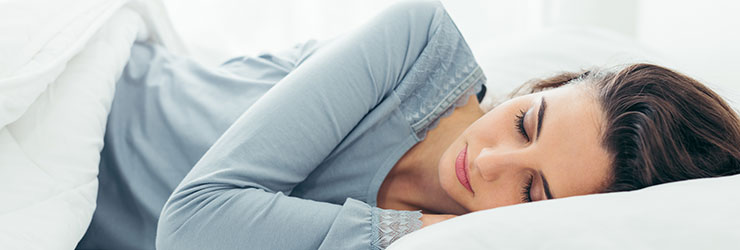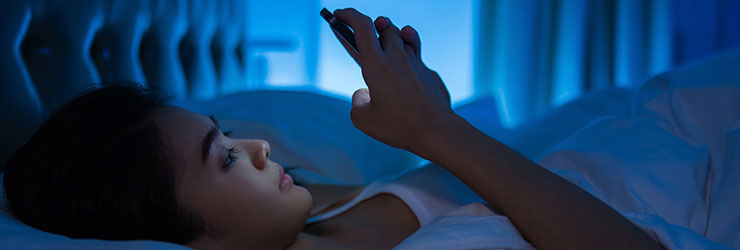Are you struggling to get great sleep? Do you wake feeling like you’ve just run a marathon - unrefreshed and perhaps with a dry mouth? Sleep is one the most important times for your body to heal and yet many people find getting a great sleep a huge challenge. Here are 5 tips to help you on your way.
September 9, 2019

Many people find themselves in the routine of eating and drinking before bed time. Whilst this is sometimes unavoidable (busy schedule or other commitments), it is important to understand that you will not sleep as well if your body is digesting food while you sleep.
Ideally, it is best if you eat at least 2 hours before you plan to go to sleep. If you absolutely need to eat or drink, keep the portions small and the content light. Be sure to avoid stimulants such as caffeine and alcohol prior to bed.
Why is eating before bed a problem? Your body is being asked to work harder than it needs to in order to digest the food, and so your breathing volume will increase. This can lead to snoring, which can be a symptom of sleep apnoea.
Screen technology is a huge reason why sleeping problems are on the rise. Culturally, we live in a time where advising to cut down on screen time is likely to be met with an emotional response.
We know that light emitted from screens suppresses the hormone melatonin (your sleep hormone). For this reason, it is important to turn off devices 2 hours before bed to get into a proper sleep cycle.
Secondly, stimulation from anything before bed is sending a message to your brain that it is not time to wind down, switch off, and go to sleep. Try reading a book, playing cards, or doing a crossword. Or perhaps listen to a calming podcast, or gentle music.

The position you sleep in can affect how you breathe and for calm high quality sleep, breathing should be gentle and through the nose. Ideally your breathing volume will actually reduce during sleep, compared to when you are awake. However, during snoring the breathing volume can be dramatically increased.
Lying on your side appears to be better than any other position, and the left side is often better than the right. Amongst Buteyko practitioners (breathing educators) this is thought to be due to the position of the heart and the gravitational effects on it, and also related to the left lung being slightly smaller than the right, such that the lungs are in a more favourable position. The take-home message is to sleep on your side but ensure your spine is straight by using a good pillow.
Sleeping on your back can be the worst position, as your mouth is far more likely to open, which in turn will increase the volume of air that you are breathing. Plus your tongue is more likely to fall back and block your airway – which can lead to stopping breathing (obstructive sleep apnoea).
Exercise is not just for losing weight or improving cardiovascular health. By moving the body for 20 minutes each day, you will help to release endorphins and increase the flow of lymph. This helps to reduce pain and inflammation – both of which inhibit good sleep.
So move, stretch, walk, jump, swim, or do whatever movement suits you best. It does not need to be a punishing 3-hour run. Simply moving the body every day will help you sleep better. Make sure you don’t exercise before bed, as this will create too much stimulation for sleep.
Breathe through your nose all night long, and make sure your tongue rests behind your top teeth.
Nose breathing is the best sleep medicine. When your nose breathes, the balance of carbon dioxide and oxygen is healthier.
As well, you will warm, filter and humidify the air which makes the air cleaner and less irritable to your airways. Add to that the fact that you will mix the air with a gas called nitric oxide (produced in your sinuses), which is antibacterial and helps to open up air passages.
Nose breathing is a great recipe for healthy sleeping as well as good health in general. If you sleep with your mouth open, there are many ways to try to learn to sleep with it closed. One simple way is to tape the lips using tapes such as the SleepYstrip.
If you struggle to naturally keep your mouth closed it could be due to a blocked nose, or could be due to the way your lip muscles are at rest, or a combination of both.
‘Lip incompetency’ (lips apart at rest) is related to mouth breathing and can sometimes be fixed with Oral Myofunctional Therapy (OMT) alone. This involves simple exercises for the lips, cheeks and tongue, and sometimes simple breathing exercises can help unblock the nose.
However, if the tongue is ‘tied’ which can lead to compensatory dysfunction in the lips, cheeks and tongue, a simple procedure called a frenectomy, combined with OMT, can help to improve the natural rest posture of the tongue. This can help establish a habit of keeping the lips closed during sleep.
